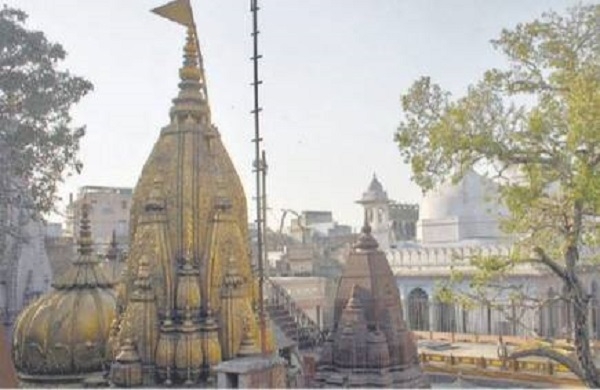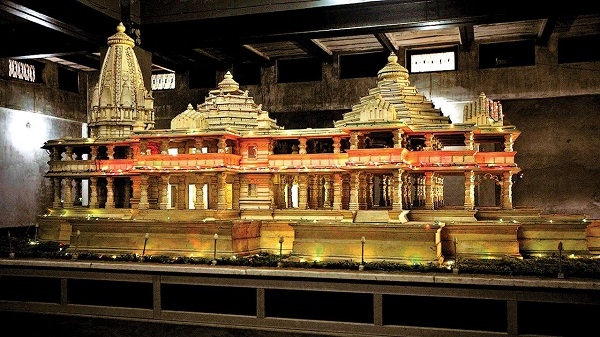Once a temple, always a temple!
16 Jun 2020 10:33:17
In a multireligious society like ours, we often talk about the principle of secularism, however it has always been used as minorityism. There is quiet a good number of examples where the principle of secularism is used against Hindus without taking into consideration that thereby their fundamental rights are severely hampered.
In many decisions, Supreme Court has observed that ‘life’ means not only life in the physical sense but a bundle of rights that makes life worth living. Denial of ‘access to justice’ does affect the equality of human life and it is indeed a ‘right to live’ guaranteed under Art. 21 of the Constitution. Inability of approaching courts and seeking justice result in denial of guarantee of equality assured by Article 14, by both ways – equality before law and equal protection of laws.

It may be the spring of Ram Janmbhumi agitation that made Parliament pass The Places of Worship (Special Provisions) Act, 1991. Section 4(1) of the said Act says “It is hereby declared that the religious character of a place of worship existing on the 15th day of August 1947 shall continue to be the same as it existed on that day.” Sub Section 2 of S. 4 further says that if any dispute regarding the conversion of religious character of any worship is pending before any court on 15th August 1947, the same shall abate and no suit or appeal in respect of that shall lie on or after the date. If such conversion has taken place after 15th August 1947, then the pending dispute thereof shall be disposed off as per the above 1st sub section. That means the status of place of worship as on 15th August 1947 shall be maintained.
Just like Ram Janm Bhumi India has a history of destruction and dispossession of Hindu Temples and encroachment upon them by the invaders. Due to the above provisions, Hindus are prevented from reclaiming these temples which were originally belonged to Hindus and now possessed by encroachers. And therefore all the above provisions act as a prohibition for Hindus to take a legal action against such encroachments. It compels to maintain whatever the position of 15th August 1947, prior disputes stand abated and declare that the status as on 15th August 1947 shall be maintained even in respect of wrongs and disputes between 15th August 1947 till the date of Act
Thus the fundamental right of access to justice has been denied to Hindus whose places of worship were forcefully converted and encroached upon. The Parliament has no legislative power to pass a law infringing fundamental right of citizens as per Article 13 of Indian Constitution. The basic principle of law is Ubi jus ibi remedium means where there is a right, there is a remedy. The issue of law of limitation doesnt arise as per the ‘continuing wrong’ doctrine. Where there is a series of continuing wrongs, the statute of limitations will be tolled to the last date on which a wrongful act is committed. And therefore a Petition challenging the constitutionality of the said provision has been filed before the Supreme Court of India and Supreme Court is moved in the matter. There is a constitutional guarantee of right to practice religion, establish religious endowments and to manage its property. Due to the provisions of this Act, Hindus are not able to enjoy this right fully.

It has been pleaded in the Petition that maintaining the status of religious place as on 15th August 1947 is illegal and unjust. If any cut off date is to be provided, that has to be the date on which India was conquered by invader i.e. Mohammad Ghori and places of worship of Hindus as were existed on the said date have to be restored in the same position with the same glory. The property once vested in Hindu Deity continues to be the Deity’s property irrespective of the fact that any person has taken illegal possession of the same. Deity, being always a minor can always sue for restoration of possession and assert the right of worship of its worshippers. In Hindus, ‘Deity’ is perpetual and immortal even if the ‘idol’ is mislplaced or rejuvenated. And therefore ‘Temple property is never lost even if it is enjoyed by the strangers for hundreds of years.’ (P.V. Kane Vol. III page 327-328) Therefore the Deity doesn’t lose its right due to large time span. ‘Once a temple, always a temple’ was argued vividly in Ram Janm Bhumi matter also.
The misuse of principle of secularism equaling it with minorityism comes into scene when we see sec. 107 of Waqf Act 1995 which provides that ‘Nothing contained in the Limitation Act, 1963 shall apply to ‘any suit for possession of immovable property comprised in any Waqf or for possession of any interest in such property.’ That means no law of limitation applies to Muslims and they can claim possession of wakf property without any restrictions of limitation. It clearly discriminates Hindus from Muslims in the matter of restoring possession of places denying, equality as provided by the constitution.
What Hindus are asking is not any right to possession, but mere a constitutional right to approach the court. After getting the legal right to remedy, all the provisions of law like primary issues, evidence etc. become naturally applicable to the dispute. Even to attract the law of limitation, the suit needs to be filed. But the very right of the same is itself taken away by the said Act of 1991. The Jamiat Ulama-i-Hind has approached the Supreme Court for impleading itself as a party in the petition and has submitted that moving in the matter would instill fear in the Muslim community. It is submitted that, the historical wrongs cannot be remedied by the people taking the law in their own hands. However, paradox is, seeking justice through courts and using right to sue itself forbids people to take law in hands.